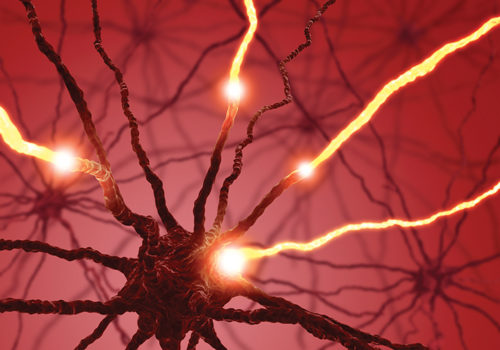What’s going on in that head of yours? A lot! Neurons are firing, blood is pulsing, hormones are being secreted and other players in the symphony of brain activity are working in harmony. But this accord can be disrupted, sometimes by aging, diet, genetic makeup or other factors. In the end, one’s memory and mood could suffer. Luckily, a smart nutritional regimen can support brain health today and many years down the road.
Why Me?
The reasons behind memory loss are vast and often overlap, but we can start with aging.
Getting up there in years. As time passes, blood flow to the brain decreases, thus reducing its ability to obtain oxygen and protein efficiently. And, Susan Hazels Mitmesser, Ph.D., director of nutrition research for Solgar, Leonia, NJ, suggests that as we age, the brain may not use certain important nutrients as efficiently as it once did, which may affect memory over time.
In the end, says Jay Levy, director of sales at Wakunaga of America Co., Ltd., Mission Viejo, CA, “Aging brain cells don’t communicate with each other as well as they once did, making it harder for the brain to process thoughts, retain short-term memory and create new cells.”
Tom Shea, Ph.D., director of neurobiology at the University of Massachusetts Lowell and scientific advisor to Sevo Nutraceuticals, Waltham, MA, points out that it is normal to lose brain cells (neurons) every day. “This is a normal facet of aging,” he states, especially since humans are living longer and longer. But he feels losing too many too early can be a problem because “we establish our brain connections in youth, and must rely on those connections for the rest of our lives.”
These effects are fairly common. Joshua 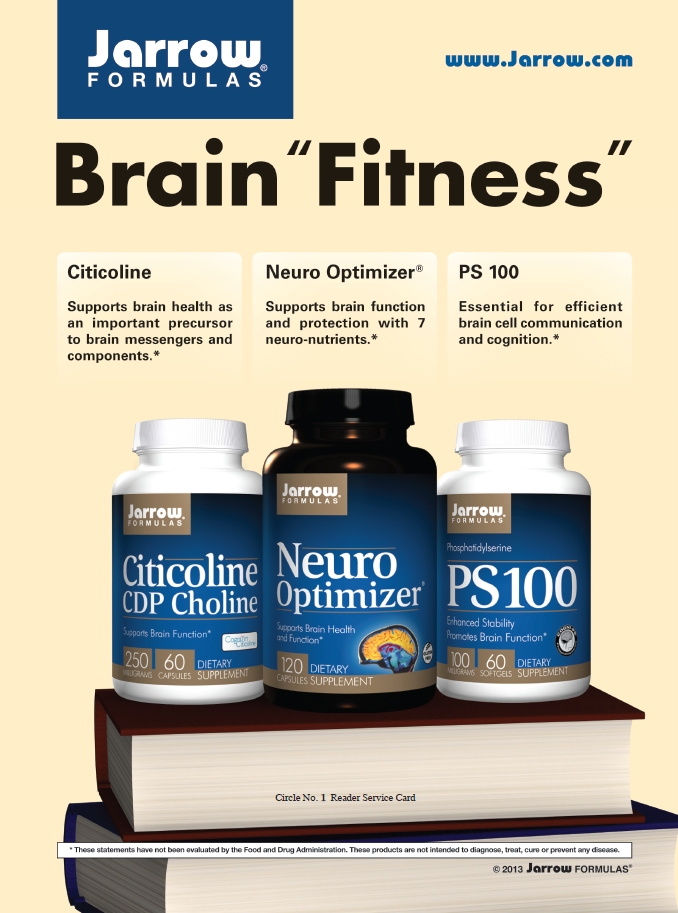 Reynolds, founder of Brain Research Labs, says age-associated memory loss affects about half the population over age 50–55. “This suggests that a significant percentage of our boomer population may be struggling to keep up with the younger generations,” he says.
Reynolds, founder of Brain Research Labs, says age-associated memory loss affects about half the population over age 50–55. “This suggests that a significant percentage of our boomer population may be struggling to keep up with the younger generations,” he says.
Damaging evidence. Also on the list of causes for memory loss, according to Michael Smith, M.D., senior health science specialist for Life Extension, Fort Lauderdale, FL, is oxidative stress, inflammation and “brain diabetes.” By the latter, he means that insulin problems can stop brain cells from accepting their primary energy source (glucose); the cells die off without it. He says these all could negatively affect memory by “damaging the connections (synapses) brain cells make to each other.”
There are many reasons why we should care about keeping healthy neural cell communication intact. According to Reynolds, “Key functions defining the strength and quality (impartial versus accurate data capture) of ‘memory traces’ are first and foremost dependent on the quality of attention (affected by neuro-chemistry addressable with supplements).” The quality of attention affects a memory’s strength and duration. Its long-term storage is “defined by both the (healthy) structure of brain tissue (e.g., synapses) and brain-chemistry (neurotransmitters), both addressable with various supplements,” he explains.
There’s more. Poor heart health and diabetes can take a toll on our brains’ energy sources, resulting in fewer or poorer functioning mitochondria and even less efficient ATP production. And that brings us to this revelation from Jolie Root, nutritionist and educator for Carlson Laboratories, Arlington Heights, IL: “Anything that threatens the health of the heart is also bad for the brain.”
Root goes on to explain that chronically high blood pressure and blood sugar damage the brain’s small blood vessels and could lead to memory loss over time. Also under the cardiovascular umbrella, Jennifer Gu, Ph.D., director of research and development for AIDP, City of Industry, CA, reminds us that those who have had a stroke are at a greater risk of memory loss.
As for shoppers who are taking statins to lower cholesterol, Chase Hagerman, business development and marketing manager at Chemi Nutra, White Bear Lake, MN, points out these drugs could also affect brain function. “That’s a big problem as about 20 million Americans use statins.” In 2012, the U.S. Food and Drug Administration told drug companies they had to add a warning on statin drugs about possible memory problems.
Grey areas. And then there’s depletion of the brain’s grey matter, which is involved in muscle control, seeing, hearing, memory, emotions and speech. “One of the causes of mild cognitive impairment is loss of grey matter in the brain with age or caused by some other condition such as illness, depression and drugs,” says Anurag Pande, Ph.D., vice president of scientific affairs at Sabinsa Corporation, East Windsor, NJ.
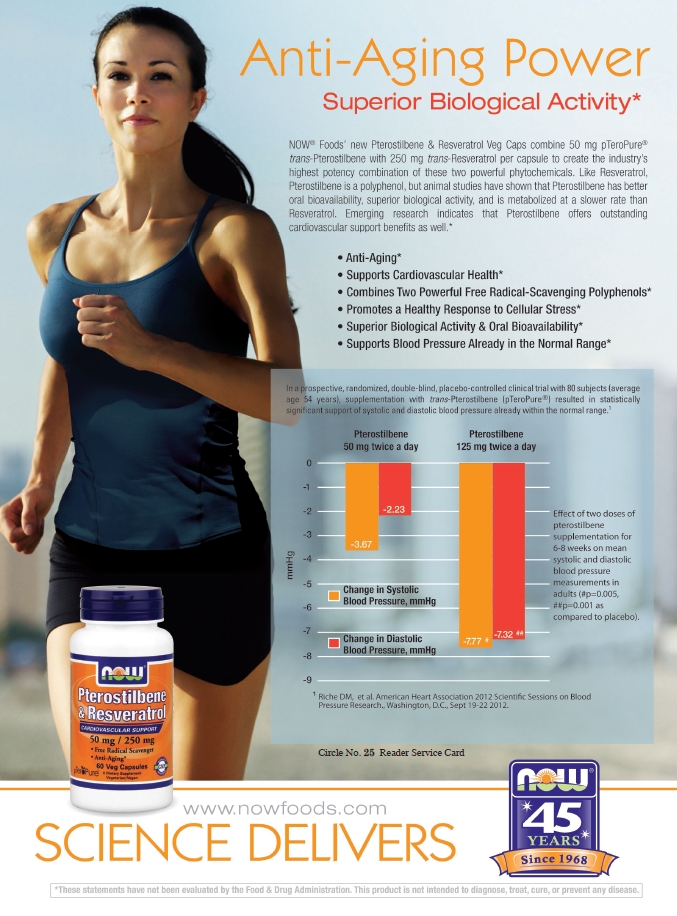 In addition, slow deterioration of the hippocampus, which is needed to record and retrieve memories, could cause cognitive decline, states Hazels Mitmesser.
In addition, slow deterioration of the hippocampus, which is needed to record and retrieve memories, could cause cognitive decline, states Hazels Mitmesser.
Food foul. We’ll get more into nutrition later, but our food and drink choices also affect our mental health over time. “As little as 10 years ago, this was not clear,” says Shea. “With continued advance of science, it is now established that nutrition contributes to brain health.”
The link is so compelling to Michael Mooney, director of research and education at SuperNutrition, Oakland, CA, that he believes the simplest answer to supporting brain health is to cut out the consumption of unhealthy food and drink, and be sure you’re getting all the nutrients you need. Hilla Attias, marketing manager of the Bioactive ingredients division for Enzymotec, Morristown, NJ, and Itay Shafat, Ph.D., cognitive category researcher, R&D, in the same division, give us some framework for this: “Today, we eat more processed food, high on fat and low on important vitamins, minerals and important lipids, many of which are proven to maintain cognitive capabilities, including memory.”
Last, it should be noted that genetic predisposition, stress, poor sleep, environmental pollutants and head trauma from injuries can also play a role in memory depletion. “These risk factors are likely to differ greatly in their mechanisms of action, timing of onset and levels of impact, but they all lead to the gradual breakdown of the neuron cell networks and eventually entire circuits within the brain,” says Gu.
Taking Control
While the causes of memory loss are diverse and may be overwhelming to those affected, it’s important to realize that many individuals may benefit from supporting the nutrient building blocks related to memory. Reynolds believes proper brain support should combine antioxidants, healthy fats, amino acids and other nutrients that support healthy blood flow and mitochondrial energy.
Multifunctional. A good base for support is a multi. States Hazels Mitmesser, “Multivitamins can offer a wide array of nutrients necessary for maintaining overall health, including that of the brain.”
While consuming a good diet and taking a multi is a good foundation for maintaining health, Shea is quick to explain that “these approaches may not manifest in improvement, but will prevent premature decline in cognitive performance.”
In agreement is Mooney, who says some  nutrients should be taken separately to provide a high enough potency for benefits. “Realize that each nutrient has to be provided in an optimal potency, which generally means higher potencies,” says Mooney, referencing a zinc study in which 20 mg of zinc doubled the visual memory speed of 13-year-olds, while 10 mg had no effect (1). He believes that DHA, too, should be taken separately for optimal benefits.
nutrients should be taken separately to provide a high enough potency for benefits. “Realize that each nutrient has to be provided in an optimal potency, which generally means higher potencies,” says Mooney, referencing a zinc study in which 20 mg of zinc doubled the visual memory speed of 13-year-olds, while 10 mg had no effect (1). He believes that DHA, too, should be taken separately for optimal benefits.
Omegas. Researchers continue to connect omegas, especially EPA and DHA, with brain health. Keri Marshall, M.S., N.D., chief medical officer at Nordic Naturals, Inc., explains why: “EPA and DHA are particularly concentrated in the brain and nervous system, where they support the transmission of brain signals and provide necessary building blocks for healthy tissue.” In the end, if brain cells are deprived of EPA and DHA, the brain and nervous system cannot function properly and memory loss could result.
Meanwhile, Trisha Sugarek MacDonald, B.S., M.S., director of R&D and national educator at Bluebonnet Nutrition Corporation, Sugar Land, TX, explains that omega-3 fatty acids also support healthy inflammation levels, which can support brain health. “This is done by omega-3’s ability to enhance prostaglandin synthesis thereby inhibiting the inflammation often associated with these conditions, as well as many other functions (e.g., supports synaptic plasticity and brain signal transmission), thus leading to better health outcomes as we age,” she states.
Root adds another interesting way omega-3s support the brain. She says that researchers now understand that the brain forms new cells and connections throughout life. This ability to grow and adapt means that one’s nutrition affects neuronal growth, she says, pointing out some specific roles of omega-3 fatty acids: building blocks for brain cell membranes, support communication between brain cells, and stimulate the production of brain-derived neurotrophic factor (BDNF, which supports the production of new brain cells and neuronal connections). “In addition, DHA may help suppress the effect of high blood sugar and insulin on brain cell communication (signaling) deficits, protect against or resolve neuroinflammation, and reduce oxidative damage that contributes to synaptic loss and neuronal dysfunction in age related memory loss or dementia,” says Root.
And Dallas L. Clouatre, Ph.D., R&D consultant to Jarrow Formulas, Inc., Los Angeles, CA, adds that DHA helps support dendritic density. Dendrites extend from neurons to help with the transmission and reception of messages.
|
Use it or Lose it Just because age-related memory loss is common, it doesn’t mean it’s one’s predetermined destiny. States Bryan See, regional product manager from Carotech Inc., “Minor memory loss should not be considered as a natural aging process.” Indeed, there are several preventative measures that can be integrated into one’s lifestyle. Tom Shea, director of neurobiology at the University of Massachusetts Lowell and scientific advisor to Sevo Nutraceuticals, provides us with several. First up, is to keep the brain active by doing exercises that make us think like doing crossword puzzles, doing Sudoku, playing “concentration” computer games, or reading. “By contrast, not doing such things lets our brain power decay over time,” he says. Next, interact with others. “Sitting home alone, and lonely, can bring on depression. Depression contributes to a decline in cognitive performance, which includes memory,” states Shea. Last, feed your brain nutritious foods, since “poor nutrition compromises brain health,” states Shea. |
Root provides some information on a recent study supporting the use of DHA and EPA for brain health. Researchers related DHA and EPA blood levels in dementia-free adults to performance on cognitive tests and MRIs (2). “In that study, people with lower blood levels of omega-3 fatty acids had lower brain volumes that were equivalent to about two years of structural brain aging,” she states. “Those in the study whose measured levels of all omega-3 fatty acids were in the bottom 25% scored lower on tests of visual memory and executive function, such as problem solving, multi-tasking and abstract thinking.”
She speaks of another study involving young adults ages 18–25. “Can we help the brain achieve its full potential by adapting our healthy behaviors in our young adult life?” Root asks. “This study showed that we absolutely can.” Participants first gave blood samples, underwent PET imaging and took a memory test (3). The more omega-3s in their system, the better they performed on tests. Then, after six months of taking fish oil, the same testing was done and improvements were recorded.
Likewise, a study of 176 18–45-year-olds found that DHA supplements boosted the memory and reaction time of those who typically didn’t have much DHA in their diets (4). These results were demonstrated when just over a gram a day of DHA was taken over a six-month period, according to Marshall.
In fact, she feels some of the most exciting new work is on the role of EPA and DHA for development, maintenance and protection of the brain and nervous system, from childhood through the elder years. Thus, supplementation can never start too early, Sugarek MacDonald believes, right from pregnancy and early childhood.
But according to Becky Wright, communications and marketing manager at Aker BioMarine Antarctic US, Issaquah, WA, the choice of omega is also key to brain health. She believes that phosphoplipid-bound omega-3s (such as that found in krill oil) are better recognized and utilized by the body. “Studies have demonstrated preferential uptake of phospholipid omega-3s in brain tissue,” she states. “The proposed mechanism is the presence of carriers that preferentially bind to and carry omega-3s into the brain; thus, phospholipids have been suggested as a superior source of omega-3s for brain tissue.”
Wright points to a new small animal study on a branded krill oil (Superba) from her company. After seven weeks, the krill oil helped improve learning and working memory and had antidepressant-like effects.
Pssst…take PS! Phosphatidylserine (PS) makes up part of cell membranes and is abundant in brain cells, according to Levy. Attias and Shafat call PS “vital for proper structure and function of brain cellular membranes.” PS helps with the gatekeeper aspects of cell membranes: it allows nutrients to enter cells and waste to exit, a process necessary for proper cellular communication. And Sugarek MacDonald adds that PS helps improve “learning, memory and cognitive function by enabling brain cells to metabolize glucose and release/bind with neurotransmitters more effectively. Ultimately, it increases communication between cells in the brain by acting as a natural emulsifier, thereby enhancing the cells’ ability to communicate within the liquid environments of the blood and cellular fluids for optimal brain health.”
But, Attias and Shafat say that while the body can synthesize PS, our naturally occurring levels of the substance are often too low and so supplementation is often a good idea. And, the benefits to the brain are broad.
“A number of double-blind clinical trials have validated the 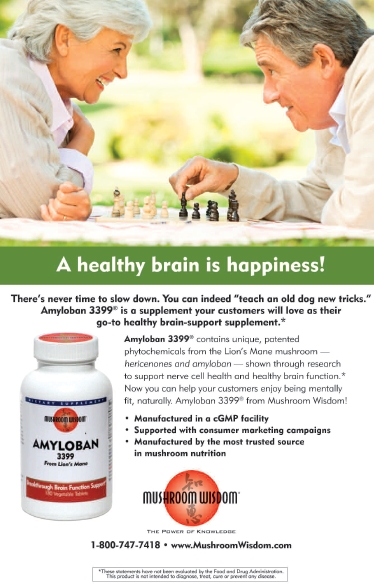 ability of supplemental plant-derived PS to improve memory, learning, concentration, word recall and mood in both middle-aged and elderly subjects suffering from age-related cognitive dysfunction,” says Levy.
ability of supplemental plant-derived PS to improve memory, learning, concentration, word recall and mood in both middle-aged and elderly subjects suffering from age-related cognitive dysfunction,” says Levy.
According to Levy, a 12-week study of 15 older individuals found that taking 100 mg of PS (three times daily) offered improvements in cognitive function in nearly all the participants, “an effect that was still going strong by the end of the study.”
Research on the benefits of PS for brain health is so compelling, say Attias and Shafat, that “PS is the only ingredient that has been granted with a qualified health claim by the FDA, related to cognitive dysfunction and dementia in the elderly.”
Let’s B clear. Many of the experts interviewed for this piece were keen on B-vitamins for brain support. “Deficiencies in nutrients, such as iron and vitamin B12, can cause serious neurological and nervous system complications,” states Hazels Mitmesser.
According to Levy, B12 is used to make and protect myelin (i.e., an insulating layer that covers nerves and allows for quick impulse transmission). “It may also keep the brain from shrinking,” he states.
He cites a recent study (5) in which “taking 400 mcg of folic acid plus 100 mcg of B12 improved delayed recall scores when taken for 24 months” in adults (ages 60–74). Levy adds, “Earlier studies show that combining folic acid with B6 and B12 also supports memory by moderating homocysteine—an amino acid found naturally in the body that, in high amounts, is considered a significant risk factor for both heart disease and dementia.”
According to Chris D. Meletis, N.D., director of science and research for Trace Minerals Research, Ogden, UT, the causes of B2 deficiency are diverse and include poor sleep, dehydration, blood sugar imbalances, elevated homocysteine levels and more. Citing a Quest Diagnostics Laboratory report, he says about 5–10% of the population are in the lower end of “normal” range (200–400 pg/mL) and may experience neuropsychiatric and hematologic abnormalities due to B12 deficiency.
Magnesium…really? A rising star in the brain health category is magnesium. One branded magnesium l-threonate ingredient (Magtein from AIDP) is being integrated into several memory support supplements. According to Gu, the ingredient has the unique ability to cross the blood–brain barrier (thereby increasing brain magnesium levels), and it “increases brain synaptic density by rejuvenating neural cells.”
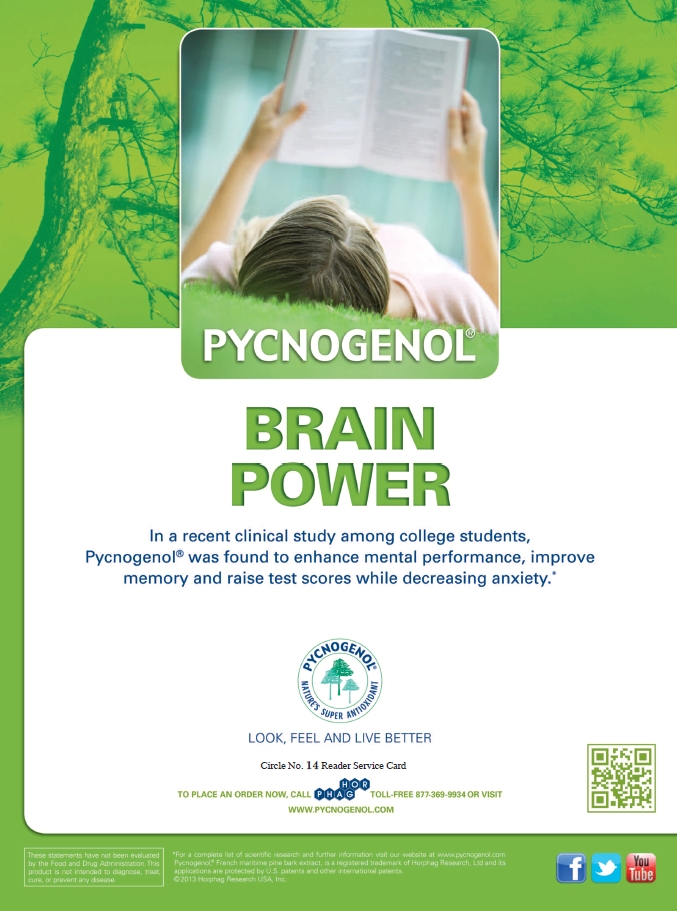 Smith says making sure cell connections are kept intact is vital for preserving memory. “Many doctors believe that the loss of these connections, called synaptic decay, is the primary mechanism involved in memory loss,” he states, adding magnesium l-threonate “helps metabolic pathways involved in restoring brain cell connection.”
Smith says making sure cell connections are kept intact is vital for preserving memory. “Many doctors believe that the loss of these connections, called synaptic decay, is the primary mechanism involved in memory loss,” he states, adding magnesium l-threonate “helps metabolic pathways involved in restoring brain cell connection.”
Gu says animal research indicates her company’s magnesium l-threonate ingredient improves short-term memory, long-term memory, spatial recognition, learning, anxiety and phobia in animal models.
Parris Kidd, Ph.D., chief science officer of Doctor’s Best Inc., San Clemente, CA, reminds us that the form of magnesium is important, since some are poorly absorbed.
King of the jungle. The lion’s mane mushroom may be especially helpful for healthy aging of the brain, says Mark J. Kaylor, vice president of education and research for Mushroom Wisdom Inc., East Rutherford, NJ. The reason why is that it “contains several compounds that have demonstrated a range of benefits for the brain and to some degree the central nervous system.” For instance, it helps protect the important myelin sheath and helps the body make nerve growth factor (NGF).
Mushroom expert and founder of Fungi Perfecti (maker of Host Defense Organic Mushrooms), Olympia, WA, Paul Stamets, D.Sc., says lion’s mane contains erinacines and hericenones, which help accomplish these feats. “Studies show these compounds regrow myelin on the axons of the nerves, helping neurotransmission. More recent research confirms memory support and enhancement from the ingestion of this species,” he explains.
Kaylor believes other mushrooms also help the brain. He feels reishi and cordyceps not only support brain health, but also help the body in its entirety. “We know that chronically high stress levels can significantly impact the brain and memory and reishi is a wonderful balancing tonic to keep this under control,” he believes.
Antioxidants aid. Antioxidants also have a variety of benefits for memory support. According to Frank Schönlau, scientific director of research at Horphag (exclusive worldwide supplier of Pycnogenol), with U.S. headquarters in Hoboken, NJ, proper brain function relies on polyunsaturated fatty acids in combination with dietary antioxidants.
Smith flags blueberries for this purpose. He explains that these antioxidant-rich berries help to reduce oxidative stress and protect brain cell structure. States Smith, “Studies show that blueberries can improve memory by up to 45% with just two to three months of supplementation.”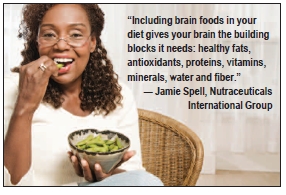
Sugarek MacDonald highlights vitamins A, C and E as being especially of interest for brain support because these antioxidants are especially effective against free radicals. “This is important because oxidation and free radicals play a role in aging, particularly in the brain,” she states.
She explains that studies suggest high intakes of vitamins E and C are associated with a lower risk of Alzheimer’s disease (AD), a form of dementia.
Bryan See, regional product manager from Carotech Inc., Edison, NJ, also supports vitamin E for brain support, and discusses the results of some NIH-funded studies: “At an extremely low concentration (Nanomolar, 10-9), d-alpha-tocotrienol helps to prevent neural cell toxicity and stroke induced degeneration.”
In See’s opinion, the tocotrienols form of vitamin E is the most helpful for brain health. “Not only are they a natural form of vitamin E, but they also possess very powerful properties in preventing stroke-induced neurodegeneration,” he states, adding his company’s form (d-alpha-tocotrienol Tocomin from red palm oil) is especially good for “protecting brain cells against glutamate-induced brain injury...the mechanisms of Tocomin SupraBio in neuroprotection are attributed to its potent antioxidant function as well as by modulating multiple intracellular signaling pathways.”
He points us to a study in which 400 mg/day of his company’s vitamin E or a placebo was given to individuals for two years. MRIs were used to examine white matter lesions, a form of brain damage connected to cardiovascular risk factors and stroke. After one to two years of supplementation, the number and size of brain lesions were reduced (6).
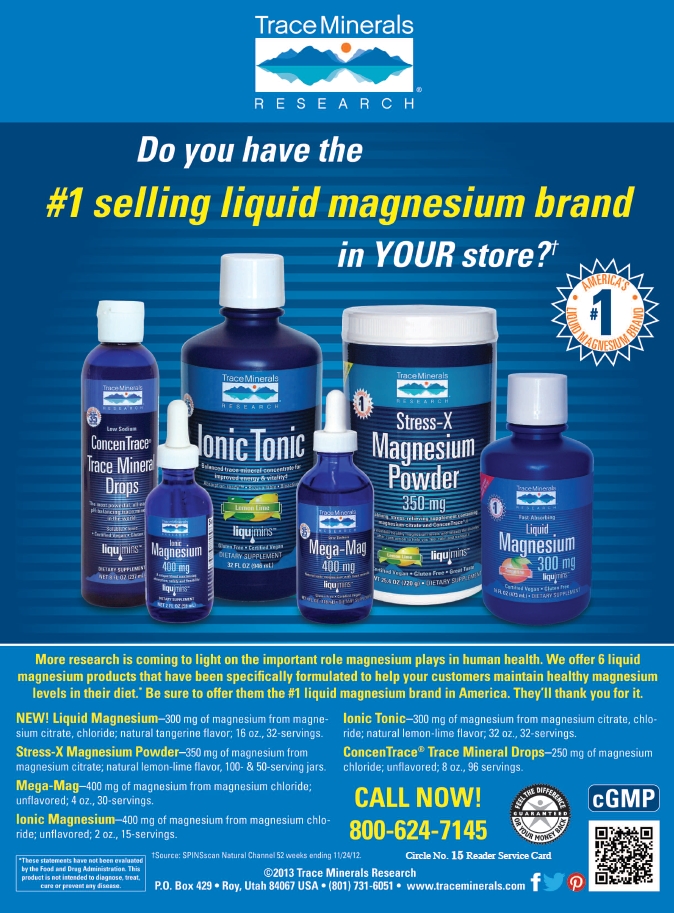 Another antioxidant of interest is a branded extract from the bark of the French maritime pine tree (Pycnogenol, from Horphag). This extract has been tested in numerous clinical trials, including one double-blind study in which it was shown to protect neuronal membranes from oxidative damage (7). Some 101 elderly individuals (60-85 years) either took 150 mg of Pycnogenol or a placebo for three months. All underwent tests for attention, memory and psychomotor performance, plus blood tests that included F2-isoprostanes levels (a marker of oxidative stress). In the end, the supplement group has significantly fewer F2-isoprostante metabolites in the blood.
Another antioxidant of interest is a branded extract from the bark of the French maritime pine tree (Pycnogenol, from Horphag). This extract has been tested in numerous clinical trials, including one double-blind study in which it was shown to protect neuronal membranes from oxidative damage (7). Some 101 elderly individuals (60-85 years) either took 150 mg of Pycnogenol or a placebo for three months. All underwent tests for attention, memory and psychomotor performance, plus blood tests that included F2-isoprostanes levels (a marker of oxidative stress). In the end, the supplement group has significantly fewer F2-isoprostante metabolites in the blood.
“In turn, the group receiving Pycnogenol did show in cognitive function tests to perform better than the placebo group,” states Schönlau. “In a recent, yet unpublished investigation, it was discovered that the Pycnogenol metabolites as they appear in humans after consumption do pass the blood–brain barrier.”
The benefits of this extract go beyond defending neural membranes against oxidative damage. Schönlau tells us that it also improves endothelial function, which is beneficial for brain health since every blood vessel in the body (including the brain) is lined with endothelial cells. These cells ensure an oxygen-rich blood supply to the brain by regulating the diameter of capillaries and arteries. “This is of high importance, especially to the brain, which is most demanding in oxygen and nutrient supply,” states Schönlau. “It was previously shown that even in healthy students, consumption of Pycnogenol over two weeks significantly improved dilation of arteries for better blood supply.” Another study is currently underway in Australia to demonstrate the effects of Pycnogenol by brain imaging tests.
 "Maintaining memory as well as the ability to carry out complex tasks with accuracy is simply the result of brain cells functioning at their best." -Tom Shea, Ph.D., University of Massachusetts Lowell, Sevo Nutraceuticals |
Energized. Clouatre explains that when reduced mitochondrial function and ATP production are a problem, “uridine and pyrroloquinoline quinone (PQQ) are among the supplements used to increase brain energy production; also, the combination of acetyl l-carnitine and lipoic acid or CoQ10.”
Building blocks. Other nutrients for memory support include CDP-choline and glycerophosphocholine (GPC) because they are building blocks for the memory neurotransmitter acetylcholine (AC), according to Meletis.
AC is key for brain health, states Hagerman, because it is involved in nearly every cognitive function. Alpha-GPC increases the immediate formation of AC, says Hagerman. “This plays many important roles in cognitive function, and it is highly involved in the transmission of impulses from neuron to neuron, and in all brain-based cognitive operations,” he explains.
Clouatre explains that memory is not only dependent on cellular membrane health, as discussed, but also on the supply of neurotransmitters. “Interestingly, an extended family of one particular substrate supports many of these factors,” says Clouatre. “This family of substances includes uridine, choline, CDP-choline and phosphatidylcholine in a brain cycle sometimes called the Kennedy Cycle.”
He specifically points to choline, which he says supports cellular membranes, neural synapse function, dendrite density and AC production. “All of these factors influence memory,” he states.
In addition, Alpha GPC can cross the blood-brain barrier, says Clouatre, and is a building block for AC as well as phospholipids that make up cell membranes. Hagerman adds that Alpha GPC helps form phosphorylcholine, which “migrates to the synaptic nerve endings found throughout the entire central nervous system, and in turn increases the synthesis and release of AC.”
These building blocks aren’t just about AC; Clouatre explains that CDP-choline along with DHA is used to make phosphatidylcholine. In supplement form, he feels CDP-choline is even more successful than taking straight phosphatidylcholine.
A recent study on a branded citicholine (Cognizin from Kyowa Hakko) found supplementation for several months resulted in better mood and sustained mental state in those with memory issues (see this month’s Supplier News on p.51 for more).
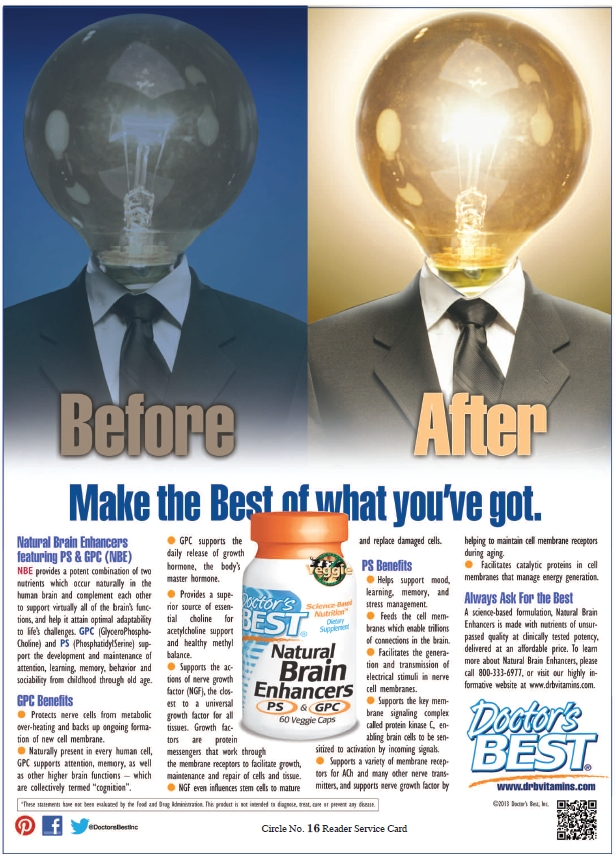 Remember these herbs. Many herbs have earned their place in the memory-support category, including bacopa, centella or gotu kola, mucuna, curcuminoids and resveratrol, says Pande.
Remember these herbs. Many herbs have earned their place in the memory-support category, including bacopa, centella or gotu kola, mucuna, curcuminoids and resveratrol, says Pande.
Levy zeros-in on two others. First is ginkgo biloba, a well-known memory enhancer. He says ginkgo improves blood circulation in the brain, scavenges free radicals and prevents premature apoptosis of neurons. “One review of 29 double-blind, placebo-controlled clinical trials found that the long-term use of ginkgo improves selective attention, some executive processes, and long-term verbal and non-verbal memory,” says Levy.
Also on Levy’s list is eleutherococcus. “Russian researchers conducting clinical trials report that a liquid eleutherococcus extract improved short-term memory and reduced reactive anxiety,” he explains.
Spotlight on Alzheimer’s Research
For many, a diagnosis of Alzheimer’s disease (AD)—a form of dementia—is as scary as being diagnosed with cancer. States Gu, “Deaths from AD have increased 66% between 2000 and 2008, while deaths from other major diseases, including the number one cause of death, heart disease, have decreased.”
For too many AD patients, life becomes a shell of what it once was with progressively impaired memory to the point that one may no longer recognize his/her own children, remember to eat meals or even have the ability to carry on a conversation.
There is no cure for this illness, yet researchers are increasingly interested in how natural compounds may help. States Reynolds, “Although genetic factors play a role, intervening early and maintaining optimal brain health and fitness from early age and over a lifetime is the most prudent way to slow down ‘normal’ brain aging, and retard, stop or even turn around the accelerated process once it begins.”
The following are just some of the interesting new studies that show potential for additional AD research:
• Sugarek MacDonald says those with AD tend to have a build-up of beta-amyloid peptide and a loss of neurons. She says resveratrol was found in lab studies to protect against the build up of beta-amyloids and reduce the death of brain cells (8).
• Also said to reduce beta-amyloid deposition in brain tissue is curcumin. “It crosses the blood–brain barrier and activates central nervous system macrophages,” says Smith. This is important because macrophages can help remove abnormal protein deposits that are found in AD patients. “It has shown a potential as an anti-Alzheimer supplement in studies carried out in various ex-vivo and animal studies in addition to human studies,” Pande says, adding he believes his company’s new curcumin metabolite (Curcumin C3 Reduct) may be especially helpful for the geriatric community because it offers “improved stability, better dosage efficiency and higher bioavailability.” A separate ingredient (Longvida from Verdure Sciences) was found in a study to reduce plasma beta-amyloid and inflammatory and oxidative markers by a small amount (9).
• Also recently noted to block beta-amyloid plaques is green tea-derived ECGC (10). According to Jamie Spell, managing director of Nutraceuticals International Group, Paramus, NJ, “Scientists determined that EGCG prevented the formation of amyloid tangles by preventing protein misfolding, and broke down existing aggregate structures in the proteins that contained metals, specifically copper, iron and zinc.” She adds that “a wealth of scientific evidence” supports the practice of drinking three to five cups of green or white tea daily to support heart health and prevent protein aggregates in the brain.
• Some research points to aged garlic extract (AGE)’s ability to benefit AD patients due to its antioxidant properties and its ability to tackle beta-amyloid peptides. Levy points to a study from Indiana University School of Medicine in which researchers found a component of AGE called S-allyl-L-cysteine helped reduce “neuronal damage from reactive oxygen species (ROS).” Levy adds that AGE may work for AD prevention in other ways too, such as supporting healthy cholesterol levels, blood pressure and healthy inflammation.
• Lion’s mane is said to help with neurotoxic peptides, too, says Stamets. He points to an experiment in which mice with peptide-induced plaque couldn’t memorize a maze. But after taking lion’s mane for 23 days, they performed significantly better. Beta-amyloid plaque in their brains was also significantly reduced. “In light of the numerous diseases related to neurodegeneration, lion’s mane deserves more clinical attention,” Stamets believes.
• DHA has numerous studies behind it in the AD research world. For one, Marshall says research from the Universita Cattolica del Sacro Cuore in Rome investigated the effects of EPA and DHA on cytokine release (hypothesizing that pro-inflammatory cytokines may play a pathogenic role in Alzheimer’s disease). Says Marshall, “While DHA seemed to be more powerful in inhibiting each single inflammatory cytokine, the combination of both fatty acids was better in reverting the pro-inflammatory profile of AD patients’ cells to a profile more similar to that found in healthy controls.” Marshall says the Oregon Health Sciences University (OHSU) is currently studying whether a fish oil from her company and alpha-lipoic acid slow the progression of AD. Meanwhile, Root highlights a review of nine studies (11) in which having higher levels of omega-3s appeared to help slow the causes of AD. She says “DHA moderates some of the enzymes that damage the tau protein, a component of the neurofibrillary tangles seen in AD.” A separate study (12), Root notes, found that omega-3s combined with vitamin D “may enhance the immune system’s ability to clear the brain of amyloid plaques, one of the hallmarks of Alzheimer’s disease.” Wright comments on this study, saying D3 plus an active form of DHA called resolvin D1 “improved the ability of the AD patients’ macrophages to gobble-up amyloid-beta, and they inhibited the cell death that is induced by amyloid-beta.”
• Another healthy fat, coconut oil, may help those with AD by giving cells ketones as an energy source; some individuals with AD have lost the ability for their brain cells to use their main energy source (glucose) because of insulin issues. Ketones are made by the liver after consuming long-chain triglycerides, such as those found in coconut oil (13).
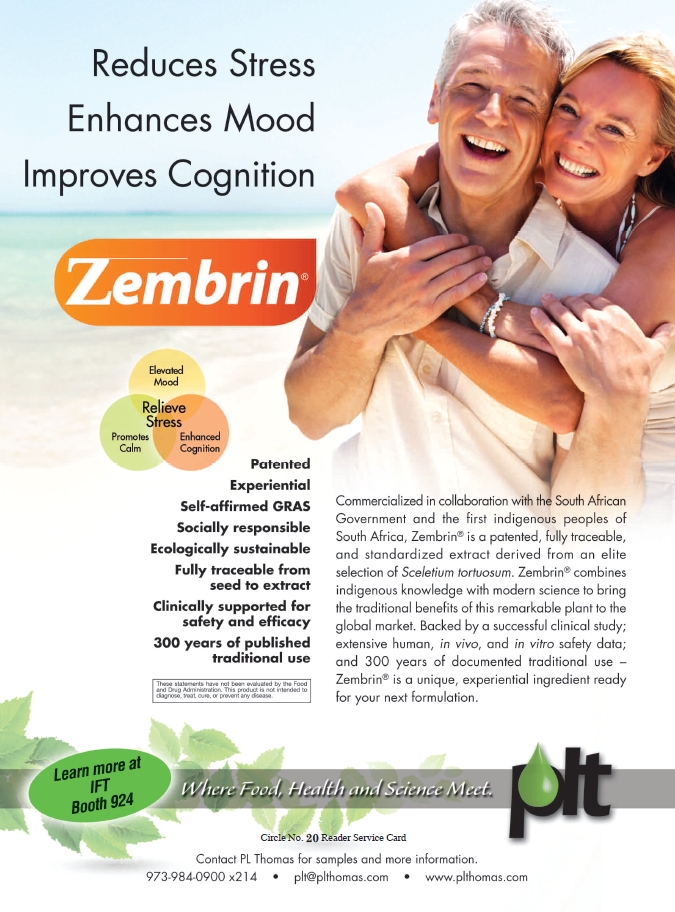 • A branded supplement (Perceptiv from Sevo Nutraceuticals) that combines vitamin E, folic acid, vitamin B12 and a proprietary blend of n-acetyl l-cysteine, acetyl l-carnitine and s-adenosyl methionine (SAMe) was shown in studies to help with cognition and memory in those with mild to moderate AD. In one study of 12 individuals with AD, participants taking the supplement had a clinically significant delay in dementia symptoms over those taking a placebo, and caregivers reported a 30% improvement in daily function (14). “A key reason why this formula is so effective is that it is a combination of beneficial ingredients,” Shea believes. “Studies with a single vitamin or supplement typically show modest or little/no beneficial effect since a single vitamin/supplement targets only a single part of what is needed to keep brain cells healthy and functioning at their peak. Current research points towards the need for combinatorial supplementation.”
• A branded supplement (Perceptiv from Sevo Nutraceuticals) that combines vitamin E, folic acid, vitamin B12 and a proprietary blend of n-acetyl l-cysteine, acetyl l-carnitine and s-adenosyl methionine (SAMe) was shown in studies to help with cognition and memory in those with mild to moderate AD. In one study of 12 individuals with AD, participants taking the supplement had a clinically significant delay in dementia symptoms over those taking a placebo, and caregivers reported a 30% improvement in daily function (14). “A key reason why this formula is so effective is that it is a combination of beneficial ingredients,” Shea believes. “Studies with a single vitamin or supplement typically show modest or little/no beneficial effect since a single vitamin/supplement targets only a single part of what is needed to keep brain cells healthy and functioning at their peak. Current research points towards the need for combinatorial supplementation.”
• Kidd offers another interesting AD research focus: altering gene function through epigenetics. He believes the most important nutrients for this purpose are “MTHF (a source of methyl groups), vitamin B12 as methylcobalamin (works with MTHF to supply methyl groups); carnitine plus acetyl-carnitine (sources of acetyl groups); and biotin.”
• Hagerman says that a large dose of his firm’s branded alpha-GPC (AlphaSize Alpha-Glyceryl Phosphoryl Choline) is considered an AD drug in Europe and Asia. “It’s pretty incredible that one ingredient is so effective that it is used in pharmaceuticals, nutraceuticals and, most recently, in food products,” he states. “But it makes sense if you follow the plethora of research.”
• Mooney says research is underway at UC Irvine on the effects of niacinamide (1,500 mg, twice daily) on AD. Niacinamide has been found to block certain proteins by removing their acetyl group. This effect has been shown in models to thwart Huntington’s disease, Parkinson’s disease and Lou Gehrig’s disease, and researchers believe it may positively affect AD patients, too (15).
• See says a combination of the different forms of vitamin E had “more of a neuroprotective effect instead of alpha-tocopherol alone” in preventing AD in one study (16). Another study indicates that those with AD had low levels of all vitamin E forms.
• Last, Gu suggests magnesium for AD support. She says magnesium functions differently than other brain health nutrients “by working on the fundamental vitality of the cells, thus naturally invigorating, reverting cells to a more youthful, healthy status.” She says her company’s magnesium (Magtein) benefits both long- and short-term memory “at molecular, cellular and behaviorial levels.”
For more on AD research, check out a blog from Reynolds on the subject at www.wholefoodsmagazine.com/blog.
Check Your Moody Rating
|
Select Brain Health Offerings AIDP: Magtein, Choline Bitartrate, Acetyl l-Carnitine HCl, Phosphatidyl Serine. Aker BioMarine Antarctic US: Superba Krill phospholipid omega-3s. Alchem: Various natural extracts. Bluebonnet: Bluebonnet’s Vegetarian DHA 100 and 200 mg Vegetarian Softgels, Bluebonnet’s EPX Brain Formula Softgels, Bluebonnet’s Power Thought Caplets, Bluebonnet’s Phosphatidyl Choline 420 mg Softgels, Bluebonnet’s Phosphatidyl Serine Complex Softgels, Bluebonnet’s Taurine Vcaps, Bluebonnet’s Age-Less Resveratrol 100, 250 & 500 mg Vcaps, Bluebonnet’s Standardized St. John’s Wort Extract Vcaps, Bluebonnet’s L-Theanine 150 mg Vcaps. Brain Research Labs: Ceraplex, Procera AVH, Omega-3 DHA. Carlson Laboratories: EcoSmart Omega-3, EcoSmart DHA, Super DHA, Norwegian Cod Liver Oil, Mellow Mood, Healthy Mood 5HTP. Carotech Inc.: Tocomin SupraBio. Chemi Nutra: AlphaSize Alpha-Glyceryl Phosphoryl Choline (A-GPC) and SerinAid PhosphatidylSerine (PS). Doctor’s Best Inc.: Natural Brain Enhancers, Best Phosphatidylserine, Best DHA 500 from Calamari, Vegetarian DHA, Real Krill, Real Krill Enhanced with DHA and EPA, Best Fully Active Folate, Best Fully Active B12, SAMe 200, SAMe 400, Best Carnitine Energy, Best AcetylCarnitine HCl featuring Sigma-Tau® Carnitine, Best Astaxanthin, Best NAC Detox Regulators, Suntheanine L-Theanine, Best Lithium Aspartate, Best Lithium Orotate, Extra Strength Ginkgo, 5-HTP, 5-HTP Enhanced with Vitamins B6 and C, Best L-Tryptophan featuring TryptoPure, Best L-Tryptophan Enhanced featuring TryptoPure, Quick Melt Melatonin, Brain Magnesium, Best Fisetin featuring Cognisetin. Enzymotec: Sharp PS, Sharp PS GREEN, Sharp PS GOLD and Sharp GPC ACTIVE. Fungi Perfecti: Host Defense Lion's Mane Capsules, Extract. Horphag: Exclusive worldwide supplier of Pycnogenol. Jarrow Formulas, Inc.: Neuro Optimizer; precursors/substrates for production of phosphatidylcholine, phosphatidylserine, cell membranes, etc. (Alpha GPC, citicoline, MaxDHA, Neuro Optimizer, Phosphatidylserine, Uridine); supporting brain energy and mitochondrial health (Acetyl-L-Carnitine Arginate, Alpha Lipoic Acid, Brainboost, Cellreset, PQQ, Uridine And Vinpocetine). Life Extension: Cognitex with Neuroprotection Complex, PS Caps, Super Bio-Curcumin, Super Omega-3 EPA/DHA, Vegetarian Sourced DHA, NeuroMag (Magnesium Threonate), Ginkgo Biloba Certified Extract, Vinpocetine, Pregenolone. Mushroom Wisdom: Brain-Mate, Lion’s Mane. Nordic Naturals: EPA, Ultimate Omega, Ultimate Omega-D3 and other fish oil products. Nutraceuticals International Group: Saffr’activ Saffron Extract. Sabinsa Corporation: Curcumin C3 Complex, Mucuna extract 10%, 15% providing L DOPA, Bacopin, Centellin, Resvenox and Curcumin C3 Reduct. Sevo Nutraceuticals: PERCEPTIV. Solgar: Wild Alaskan Full Spectrum Omega; Omega-3 Fish Oil Concentrate; Double Strength Omega-3; Triple Strength Omega-3; minnows omega-3 mini bursts; Earth Source Organic Flaxseed Oil; Flaxseed Oil; Omega-3 Vegetarian DHA; SFP Ginkgo Biloba Leaf Extract; FP Super Ginkgo; Phosphatidylserine; Phosphatidylserine Complex; Gentle Iron; Chelated Iron; Vitamin B12 Nuggets/Tablets/Vegetable Capsules; Methylcobalamin Nuggets; Sublingual Liquid B-12 2000 mcg with B-Complex; B-Complex “50” and Megasorb B-Complex “50”; B-Complex “100”; B-Complex with Vitamin C Stress Formula; Ultimate B+C Complex. SuperNutrition: Think Clearly. Trace Minerals Research: Electro-Vita-Min Daily 5, Liquid Multi Vitamin-Mineral, NaturalRest Plus+, Stress-X. Wakunaga: Kyolic Neuro-Logic, Kyolic Ginkgo Biloba Plus, Gingko-Go!, Kyolic Formula 101 Stress & Fatigue Relief. |
If shoppers are feeling moody and just not themselves, proper nutrition and supplementation could help, with a doctor’s approval.
Reynolds says one of the most important things for mood support is balancing blood sugar. “At the top of the list is attenuating blood sugar swings, especially after a meal, and minimizing chronic low blood sugar (hypoglycemia),” he states.
Numerous natural compounds are known for blood sugar support. Among these, Reynolds says, are starch blockers (like Phase2 from Pharmachem), alpha-amylase inhibitors, American ginseng, gamma-tocopherol, EGCG (from green tea), alpha lipoic acid, acetyl-l-carnitine, bitter melon, chromium, fenugreek, banaba and Gymnema sylvestre.
Reynolds and others point out that like memory support, supplements that benefit healthy neurotransmitter activity can help. “A healthy mood, like memory, is a function of neurons working at their peak,” says Shea, who points out that this includes proper neuron communication by releasing chemicals (i.e., neurotransmitters). “When our neurotransmitters are out of balance, we can have problems with mood,” he states.
Reynolds notes that “many anti-depressant drugs (i.e., SSRIs) increase available serotonin by inhibiting its uptake,” and adds that several supplements (like 5-HTP, L-tryptophan, St. John’s Wort, SAMe, L-theanine and vitamin B6) are said to raise serotonin levels. In fact, B-deficiencies may decrease serotonin levels, according to See.
Another way to increase serotonin levels, says Spell of Nutraceuticals International Group, is with saffron. “Numerous clinical investigations support the efficacy of saffron in alleviating feelings of anxiety, stress and light depression…A new study compared the effects of saffron with fluoxetine [the main ingredient in anti-depressant drugs like Prozac] on the symptoms of mild to moderate depression,” she states. Better results were recorded with the natural compound.
Meanwhile, some formulas address mood problems by inhibiting norepinephrine, which is said to ease depression by altering how neurons communicate. Reynolds says supplements that support this include rhodiola, L-tyrosine, L-phenylalanine and Citrus aurantium. He adds, “St. John’s Wort is believed to inhibit the uptake (therefore increase active levels) of serotonin (5-HTP) plus dopamine and norepinephrine.”
Still other supplements (GABA, valerian, passion flower, l-theanine, magnolia bark, hops and others) support healthy levels of the neurotransmitter gamma-aminobutyric acid (GABA). “Low GABA levels are implicated in anxiety, manic states and sleep loss,” says Reynolds.
In agreement is Levy, who says “GABA helps ‘turn-off’ a busy mind at night to prevent insomnia and restlessness.” GABA deficiency may put a person in a state of over-excitement; he adds that those who suffer from anxiety, attention deficit disorders, hyperactivity disorders and panic attacks may have a natural GABA deficiency and thus supplemental GABA can help.
Meanwhile, PS may help block the stress hormone cortisol, which helps with mood support, says Hagerman.
There’s a link to DHA, too. According to Root, DHA-induced brain-derived neurotrophic factor (BDNF) helps push neurons to produce more BDNF and other neurotransmitters. “Low levels of BDNF have been associated with depression and even suicide,” she states.
“In our most recent study, omega-3s were found to improve mood without causing sedative effects, which is common with most antidepressants,” adds Wright.
While space doesn’t allow for a full discussion of anti-stress support products, retailers should understand their place in this market segment. “Supplements that can help to reduce mild stress, anxiety, sleep disorders and depression can help to improve mood disorder symptoms,” says Pande, pointing out that bacopa may help with chronic stress. And, Kaylor adds that lion’s mane, reishi and cordyceps all bring systemic and specific benefits to mood. WF
References
1. Federation of American Societies for Experimental Biology, “Zinc Supplementation Improved Mental Performance of 7th-Grade Boys and Girls,” press release distributed Apr. 4, 2005, www.eurekalert.org/pub_releases/2005-04/foas-zsi032005.php, accessed Apr. 24, 2013.
2. Z.S. Tan, et al., “Red Blood Cell Omega-3 Fatty Acid Levels and Markers of Accelerated Brain Aging,” Neurol. 78 (9) 658–664 (2012).
3. R. Narendran, et al., “Improved Working Memory but No Effect on Striatal Vesicular Monoamine Transporter Type 2 after Omega-3 Polyunsaturated Fatty Acid Supplementation,” PLoS ONE, 7 (10): e46832 DOI: 10.1371/journal.pone.0046832 (2012).
4. W. Stonehouse, et al. “DHA Supplementation Improved Both Memory and Reaction Time in Healthy Young Adults: A Randomized Controlled Trial,” Am. J. Clin. Nutr. 2013 Mar 20.
5. J.G. Walker, et al., “Oral Folic Acid and Vitamin B-12 Supplementation to Prevent Cognitive Decline in Community-Dwelling Older Adults with Depressive Symptoms—The Beyond Ageing Project: A Randomized Controlled Trial,” Am. J. Clin. Nutr. 95 (1) 194–203 (2012).
6. “Neuroprotective and Cardioprotective Effects of Palm Vitamin E Tocotrienols,” http://clinicaltrials.gov/ct2/show/NCT00753532, accessed Apr. 24, 2013.
7. J. Ryan, et al., “An Examination of the Effects of the Antioxidant Pycnogenol on Cognitive Performance, Serum Lipid Profile, Endocrinological and Oxidative Stress Biomarkers in an Elderly Population,” J. Psychopharmacol. 22 (5), 553–562 (2008).
8. X. Feng, “Resveratrol Inhibits β-Amyloid-Induced Neuronal Apoptosis through Regulation of SIRT1-ROCK1 Signaling Pathway,” PLoS One 8 (3), Epub Mar. 28, 2013.
9. “New Trial Data on Longvida Optimized Curcumin,” www.longvida.com/Curcumin-Clinical-Data.html, accessed Apr. 24, 2013.
10. “Green Tea Extract Interferes With the Formation of Amyloid Plaques in Alzheimer’s Disease,” www.sciencedaily.com/releases/2013/03/130305145137.htm, press release distributed Mar. 5, 2013, accessed Apr. 24, 2013.
11. G.M. Cole, et al., “Omega-3 Fatty Acids and Dementia,” Prostaglandins Leukot Essent Fatty Acids 81, 213–221 (2009).
12. M.T. Mizwicki, et al., “1α,25-Dihydroxyvitamin D3 and Resolvin D1 Retune the Balance between Amyloid-β Phagocytosis and Inflammation in Alzheimer’s Disease Patients,” J. Alz. Dis. 34 (1), 155–170 (2013).
13. “Coconut Oil Touted as Alzheimer’s Remedy,” www.cbn.com/tv/1472017228001, accessed Apr. 24, 2013.
14. R. Remington, et al., “Efficacy of a Vitamin/Nutriceutical Formulation for Moderate-stage to Later-stage Alzheimer’s disease: A Placebo-controlled Pilot Study,” Amer. J. Alz. Dis. Other Dimen. 24 (1) 27–33 (2009).
15. “Safety Study of Nicotinamide to Treat Alzheimer’s Disease,” http://clinicaltrials.gov/ct2/show/NCT00580931, accessed Apr. 24, 2013.
16. F. Mangialasche, et al., “Tocopherols and Tocotrienols Plasma Levels Are Associated with Cognitive Impairment,” Neurobiol. Aging 33 (10), 2282–2290 (2012).
Published in WholeFoods Magazine, June 2013

